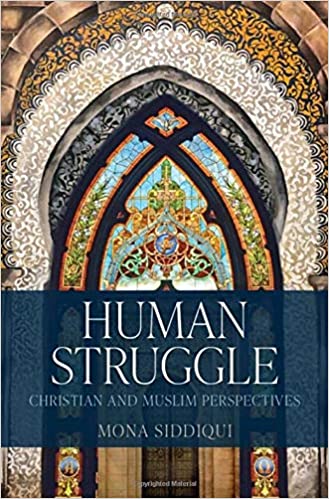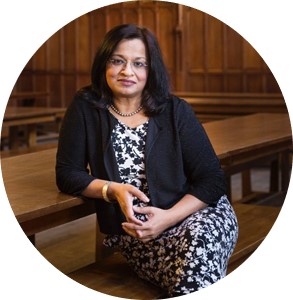
Human Struggle: Christian and Muslim Perspectives
Mona Siddiqui
In this section from chapter two of Human Struggle: Christian and Muslim Perspectives, Professor Siddiqui compares how Abu Hamid al-Ghazali and Rainer Maria Rilke wrote ‘letters’ to a younger student in which both men express their intellectual restlessness and search for faith, meaning and salvation. Abu Hamid Muhammad al-Ghazali was a famous medieval Sunni philosopher-theologian and mystic. Rainer Maria Rilke, a 19th-20th century Austrian poet, is not even considered a believing Christian by many. Yet his reflections on life and death, good and evil, human desire, and searching are a compelling testament to the thinking of a profoundly religious individual. Despite their very different historical, civilizational and cultural backgrounds, the distance of time and space, their works explore one of the fundamental human struggles which is how to reconcile ourselves to impermanence and yet find meaning and salvation in life.
God is a paradoxical constant for Rilke, embodying all that he cannot understand or resolve. Rilke and Ghazali both wrote of struggle and suffering as they experienced it in their own lives and as the basis of the human condition. As a poet-mystic, Rilke searched for and extolled solitude as the creative refuge for the artist and as a theologian mystic, Ghazali saw that remembering death, repentance and prayer were the secret to the human condition. For Ghazali, the awareness that we take nothing into the next life other than our good deeds gave a new meaning to this life and his search for spiritual growth. The letter form gives their thoughts a more personal touch even though their advice is undoubtedly for a wider audience. Ghazali was a theologian and Rilke was a poet but their letters were fragments of advice to themselves as well as to their recipients. Both thinkers travelled in search of inner solace and for their own intellectual well being. For Ghazali, the Qur’anic verse, “the mercy of God is near to those who do good” (Q7:56) guided his writing. Humankind searches for meaning and repose everywhere but there is no meaning to life outside of worship of God. Ghazali was a dedicated scholar; he admits that theory was easier for him than practice and yet he struggled with conventional scholasticism and the limits of the intellectual life. Theological sophistry was seductive but had failed to resolve the deeper yearning for truth and peace, and it is not clear whether he ever did find the inner peace for which he appears to have searched so desperately. But self discipline is important for great thinkers and his writing in which his philosophical reflections stayed largely within Sunni orthodoxy, still gave order to his life. His purpose was to convince his reader that the intellectual life was worthy but no substitute for the life of pious devotion; the remedy was worship and it was only through worship and prayer, the inner spirit that one experienced God. Remembering the next life, working for one’s salvation in the hereafter are the themes which infuse his advice to his disciple. The future is inevitable, divine judgement is inevitable and if we forget that, we forget the only truth which matters in life. The very impermanence of life is proof that this life is no more than a preparation for the next and that it’s sole purpose should be a turning to God. It is only because “God is kind” that we humans become complacent. His advice in Ayyuha might be the succinct distillation of all his learning.
Yet Ghazali is also a writer of hope. While judgement in the afterlife is real and should be our ultimate concern, as believers, if we do not have hope we do not have belief. There is no end to God’s mercy because there is no end to God’s goodness. In his writings we find several traditions defining the importance of hope as a basis for human devotion and worship:
It is related that there were two devotees equal in devotion. When they entered the garden, one of them was elevated to the highest degree over his companion. So he said, “O Lord in what way did this man exceed me in devotion on the earth? Yet you have elevated him over me in the highest heaven.” So God says, ‘Truly, while he was on this earth he was constantly asking for the highest degrees, while you were asking for salvation from the fire. So I have given every creature his request. And this is a pointer to the fact that worship which is on account of hope is the more meritorious because love dominates the person who hopes more than it does the one who fears.’1William McKane, Al-Ghazali’s Book of Fear and Hope, Leiden: Brill, 1962, 21-22.

But for Rilke, there was no salvation or hope outside the experience of this life. If suffering and pain drove us to a higher consciousness, physical desire and sensual experience were also a kind of pure knowledge. This desire has been granted to us so that we can know the world in its fullness. Pleasure is not a bad thing but what is bad is that “almost all of us misuse the experience and waste it and apply it as a stimulus to the tired parts of our lives as distraction instead of as a concentration of ourselves.”2Rilke, Letters, 24-25.
The exploratory discursiveness of his writing articulates “experiences of ‘disbelieving’ and ‘unknowing’ that tacitly destabilize normative concepts of belief and knowledge.”3Castelvedere, “Neither Religion” 134. His concern with human salvation casts his writing into the religio-philosophical realm but this search for the divine is a search for that reality which remains within and paradoxically beyond the grasp of human understanding; God is a mix of symbols and imagery. Life can be merciless but Rilke’s advice to the young poet is abound with an optimism, even hope which the artist must feel and project not loudly but with delicacy and quiet. He could express this aspect of God for those for whom there is no God, no afterlife, no heaven or hell, no redemption or salvation, heaven and hell are here and now. Our earthly existence, brief, solitary and rarely happy, is still meaningful, because to have lived once as he says in his Ninth Elegy, that cannot be taken away from us, “Never again. But having been earthly, just this once even though it was only once, can never be taken back.”4Good, Rilke’s Late, 49. I have substituted “can never be taken back” for irrevocable as in Good’s translation. Everything is transient, but human imagination and solitude recognizes and gives meaning to life’s impermanence. Poetry is not a triumph over transience but a celebration of it. As “Poetry is not a separate enclosure, walled off from time and decay; poetry is existence.”5Good, Rilke’s Late, 17.
Humankind searches for meaning and repose everywhere but there is no meaning to life outside of worship of God.
Rilke’s God may not have promised immortality in the next life but he was the metaphor for the most intensely conscious part of mankind. Rilke was explicit that he didn’t care for the Christian concept of an afterlife because “it makes us less present and earthy. As long as we are here, and cousin to tree, flower, soil, may all that is near at hand be real to us and enter fully our awareness.6Macy and Barrows, A Year, 292. For Rilke like that of other artists, darkness is the place of God’s becoming, darkness is the matrix of artistic life when creativity is at its peak and all kinds of future worlds are possible. He writes, “I cherish my mind’s hours of the dark, in which the extended senses sink and deepen; there as in old letters recollected I find my daily life already lived, distant, quiescent, more as legends are. And from them I become aware that in me I build room for a second, time-wide life.”7Ben Hutchinson (ed.), Rainer Maria Rilke’s The Book of Hours, A new Translation with Commentary, translated by Susan Ranson, Woodbridge: Boydell and Brewer, 2008, 7.
Both writers with their vastly different backgrounds and religious and cultural contexts still speak of the essential human search for truth and meaning. Their writings reveal their inner journeys and some of their inner contradictions as they dealt with the crisis of epistemology. As Ulrich Baer writes, “In our age that is so hungry for spiritual sustenance and so easily seduced by the promise of salvation, Rilke proves relevant by defining love as modern man’s equivalent of the prayer to our vanished gods.”8Baer, The Wisdom, xii. Rilke wanted his poet to search for meaning in the very questions of our lives. He urged the young poet to be patient in his search and not to measure his art in terms of time. Ghazali was frustrated with what he had studied and learnt. He wanted to know more, he wanted a faith which could possess him leaving no room for feelings of doubt, and he wanted answers to his perennial questioning. Ghazali wanted to feel closer to God and was desperate that his faith and devotion would be the solution to his spiritual and intellectual dilemma. He was convinced of the truth of an afterlife which for him, demanded turning away from the temptations and desire of an earthly existence. But he remained torn because human nature yields to both the earthly and the divine. Rilke, for his part saw that all the happiness we seek in this world, in which we seek refuge, is not unworthy of desire, it is simply that it is transient. How we face death depends on how we choose to live. Rilke, despite his untimely death and his very real suffering, felt that life had to be lived with truth, imagination and recognition of our uniqueness. He found beauty and cruelty in almost everything but did not lose faith in life’s greater meaning which lay beyond this life. We give and we take from life as he writes in the Sonnets:
Don’t be afraid to suffer: the burden,
Give it back to the weight of the earth;
heavy the mountains, heavy the seas.9Good, Rilke’s Late, 62.
His poetry is scattered with images which speak of a desperate desire to experience the transcendence and goodness of God within the mystery of our earthly life. The poet breathes and imagines with dread and hope. Yet, Rilke is always grateful for life, that when all said and done, it is good to have made the passage here willingly, so that at the end one will be wonderfully prepared for the relationship with the divine. ♦

Mona Siddiqui is Professor of Islamic and interreligious Studies and Assistant Principal for Religion and Society at the University of Edinburgh. She is also a regular contributor to national and international media. Her research areas are in Islamic jurisprudence and Christian-Muslim relations and her latest book is Human Struggle: Christian and Muslim perspectives.
Recommended Citation
Siddiqui, Mona. “Human Struggle: Christian and Muslim Perspectives.” Canopy Forum, March 19, 2021. https://canopyforum.org/2021/03/19/human-struggle-christian-and-muslim-perspectives/

